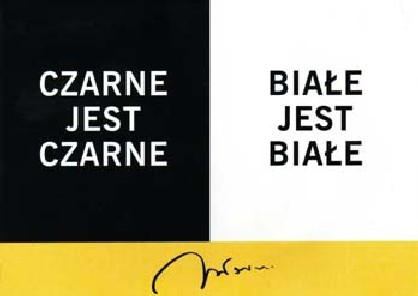| Return to main page |
There are innumerable ways one could formulate such a project here in Cracow. Some of you might be interested in contacting the organised political parties. You could pay them a call and read their literature to help you to understand their views on a range of current issues. They are all very busy at the moment, in preparation for the Presidential election to be held later this year. One of the candidates, unless he withdraws on health grounds, is Lech Walesa. The charismatic electrician who helped to found the Solidarity movement twenty years ago went on to be elected our first postcommunist President in 1990. But he was defeated in the elections of 1995 by an ex-communist. This incumbent seems at present to be on course to repeat his success in 2000, aided by the fact that the opposition to him is by no means united behind the candidacy of Walesa. Here is the former Solidarity leader's main campaign poster for this year, a simple text which reads 'Black is Black, White is White', and underneath the candidate's illegible signature. Perhaps it is not hard to explain why such a polarised view of political life does not have the same appeal to voters that it had in communist days.

Figure 29: Lech Walesa's straight-talking campaign poster
Among alternative projects this week, some of you might like to start by taking a walk around our national museum, which will tell you a dood deal about the enduring strength of certain national symbols in this country. Or you could go along to some of the public debates of our city council and see our local politicians in action. But I prefer today to do something altogether more mundane with you, you might even consider it banal. I'd like to invite you to a meeting on our estate, where all those interested have been invited to meet the city's Chief Environment Officer to discuss the location of a new waste disposal site. I'll explain more of the background in the tram on the way. It's been dragging on for years. The city needs a new dump, but of course no one wants it in their area. Now, for the third time in a row, a committee of experts has said that it should be built two kilometres from our block. We would receive no compensation, but we are convinced that this will reduce our quality of life, not to mention the market value of our properties. Since quite a lot of my University colleagues live on this estate, I think I can promise you a sophisticated level of debate. Pay close attention to the speeches made and try to specify which rhetorical style is most effective.
The public meeting lasted nearly three hours. For more than two hours officials stepped forward to deliver prepared speeches in rather ritualistic ways. Some did it much more effectively than others, but the whole performance was frustrating for Ania and Tom. However, their boredom vanished during the time set aside at the end for questions and free discussion. First their Professor chimed in with evidence concerning how such disputes would be resolved in the highland districts of New Guinea, but this contribution did not seem to receive the response he had hoped for. The most effective contributor was not one of the university professors at all, but an old man who declared that the last time he had heard of plans to dispose of waste so close to crowded settlements was during the Second World War, when the Nazis could not have cared less about the damage their schemes might do to the health of local people. 'Have we really sunk so low as to go back to the standards of Hitler?' asked this speaker. The crisp, rational responses of the officials indicated that, for them, this comparison was totally inappropriate. Nonetheless they could not dispel its effects on the audience. Several more speakers referred in increasingly emotional language to the evils committed by the Nazis. Sensing the mood of the meeting, the Chief Environmental Officer eventually promised to bring a revised proposal forward for discussion later in the year.
'You see,' said the Professor, 'a fine example of local democracy in action!'
| Return to main page |